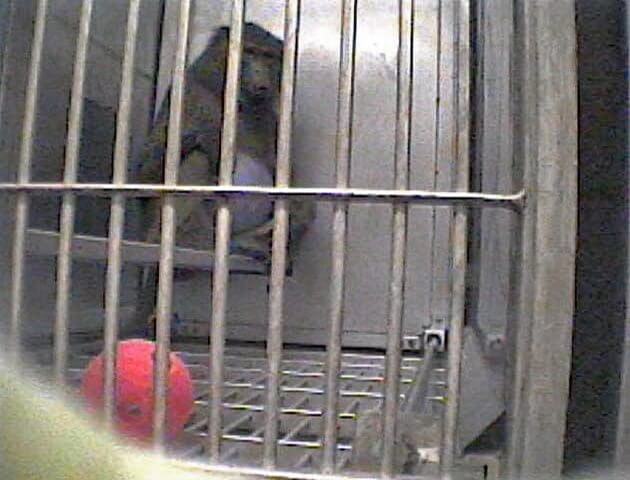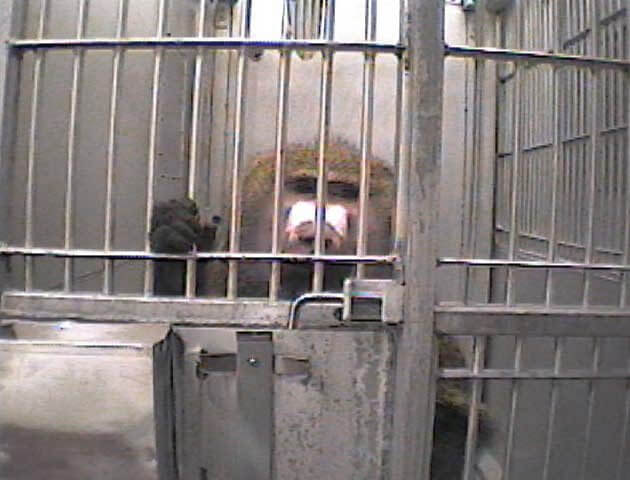Cruelty Causes Cannibalism in Columbia University’s Laboratories
Inattentive staff at Columbia University laboratories left mice for days without water. The highly stressed animals resorted to eating one another.
Sadly, cannibalism is not the only problem PETA found in the New York university’s labs, where federal records document an ongoing culture of neglect and cruelty. In a letter to Columbia President Lee C. Bollinger, we’ve demanded that he take personal responsibility for—and swift, decisive action against—the negligence of laboratory staff for numerous and ongoing violations of federal animal welfare standards.
In a letter to the U.S. Department of Agriculture, PETA demands that the agency launch an immediate investigation into Columbia’s abundant and severe violations.
| In 2002, a postdoctoral veterinary fellow working in Columbia University’s laboratories informed PETA of shockingly cruel experiments on dogs, monkeys, and other animals. |
Federal records that we unearthed from the National Institutes of Health document 22 violations of federal animal welfare guidelines in Columbia laboratories over the past six years. The violations range from fatal staff neglect to experimental surgeries performed on animals without apparent consultation with or approval of oversight committees.
Two experimenters performed separate invasive surgeries on a single monkey, even though only one of the procedures had been approved. In another incident, experimenters injected a guinea pig with an unapproved virus.
Neglect in Columbia labs runs rampant, as the following examples illustrate:
- Experimenters restricted the water intake of two monkeys for 40 days, even though they weren’t actively being studied at that time, and a baboon received no water for three days.
- More than 122 adult mice and their babies died from dehydration because experimenters had given them no water. Some of the mice cannibalized each other.
- Mice in four cages had no food, water, or bedding. In another incident, mice in as many as 30 moldy cages were severely crowded and in an unapproved location for days with scarce food and water. An undetermined number were affected or died.
- Seven mice died and 23 others were euthanized because experimenters had performed unapproved transplantation surgeries on them.

In addition, some experimenters were untrained and unapproved to perform procedures on animals:
- A staffer failed to do daily health checks on frogs—and it was determined that the person wasn’t adequately trained or even listed on the experiment.
- Experimenters failed to use aseptic techniques while subjecting mice to surgeries, used unapproved drugs, or failed to administer pain relief to the animals. Some conducted surgeries in unapproved locations.
Experimenters in Columbia’s labs falsified records. In one incident, an experimenter responsible for administering drugs to a monkey who had endured a full-body radiation procedure that caused the animal to be immunosuppressed, checked off boxes on medical records indicating that the drugs had been administered. However, the experimenter failed to give the medication for two weekends.
In another incident, a veterinarian kept shoddy medical records of a monkey’s skin lesion. It wasn’t the first time the vet had been warned about poor recordkeeping.

Columbia received over $640 million in taxpayer funds in 2021, yet it still can’t be bothered to follow the minimum standards of care set forth in federal animal welfare regulations and guidelines. This outright, ongoing betrayal of the public’s trust cannot be tolerated.
The university must hold rogue experimenters accountable for violating federal animal welfare regulations or guidelines. Their experiments must be canceled, and their permission to use animals for experimentation must be revoked, along with their access to all animal laboratories.
Better yet, Columbia could easily put itself on the vanguard of scientific discovery and compassion by implementing PETA scientists’ Research Modernization Deal (RMD)—a strategy for replacing animal experiments with modern, human-relevant, animal-free research methods.

